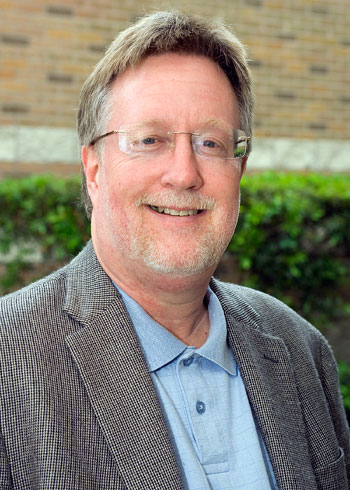Education Prof Discusses 'Distinguished' Career As Counselor, Teacher
Oct. 14, 2011
SHSU Media Contact: Jennifer Gauntt
 SHSU Distinguished Professor of Counselor Education Richard E. Watts is a fan of Sir Arthur Conan Doyle’s Sherlock Holmes series.
SHSU Distinguished Professor of Counselor Education Richard E. Watts is a fan of Sir Arthur Conan Doyle’s Sherlock Holmes series.
To Watts, there are a lot of similarities between detective work and his chosen field.
“Holmes is always looking for that which is typically overlooked, and it’s very important to do that with clients as well,” Watts said. “He was looking for things that are out of the ordinary. Those sorts of things fascinate me.
“I also think it’s important in counseling because you need to pay attention to what’s there, but you also need to pay attention to what might be overlooked,” he said. “Many times with the things that are overlooked, clients, for whatever reason, are protecting themselves and that’s what needs to be addressed.”
Watts’s “detective work” has led to a 22-year career in counseling that has been filled with accolades and recognitions. A “primary source,” one who has either created theories or is considered an expert in a theory, on Adlerian psychology, his vast publications have led to his being recognized as one of the 20 most prolific authors in his discipline.
In addition, he has received the Association for Spiritual, Ethical, and Religious Values in Counseling’s “Meritorious Service Award;” the American Counseling Association’s “Fellow Award” and their David K. Brooks, Jr. Distinguished Mentor Award; and the Texas Counseling Association’s “Presidential Award.”
Having sat on the national board for the Council for Accreditation of Counseling and Related Educational Programs, Watts was also was essential in the CACREP accreditation of SHSU’s doctoral counselor education program, which he also directs.
When Watts came to SHSU as a professor in 2005, he was, in a sense, returning home.
His time on campus began as an undergraduate, studying music education with the goal of attending seminary. It wasn’t until he began his career in the church, while simultaneously attending seminary, that his interest in counseling was piqued.
“I was a church choir director for 11 years. Part of my job was directing the music at the church, and I was also in charge of the teaching ministries of the church,” he said. “As part of my job, people would want to come in and talk to me about the problems they were having, and I didn’t have a clue what to do with them. It scared me.
“I started reading books on counseling to try to be helpful to them, and I discovered I had a knack for it. So I decided to study counseling at the master’s and doctoral levels, thinking I would be an associate pastor at a larger church for pastoral ministries,” Watts said. “It wasn’t until I was about halfway through my doctoral program that I realized I was going into higher education.”
When Watts was offered a teaching fellowship at the University of North Texas, he found that he loved teaching and was good at it. He was encouraged by the faculty there to pursue counselor education and eventually left the church to finish his doctorate. He taught at Texas A&M University—Commerce, Kent State in Ohio and Baylor University before coming to SHSU.
Watts attributes “a combination of values instilled in me by my faith community and the encouragement that I received as a student at Sam Houston” for his career success.
“There’s a passage of scripture that says ‘Whatever you do, do it for the glory of God,’” Watts said. “I strongly believe that. I believe in hard work, I believe that whatever I do, I should do it to the best of my ability.”
But in particular, Watts said, he wouldn’t be where he is today if it weren’t for the influence of an education professor named Tom Murray, whose one class not only sent him on the right path academically but ultimately influenced his teaching style.
“I didn’t see myself as being particularly strong academically; I was also lazy, but I wouldn’t admit that back then. He (Murray) kept telling me of all of these abilities he saw in me that I didn’t see in myself, but it planted a seed and my grades started improving because I actually believed what he said. He allowed me to be myself and I really got involved and participated in the class, and that was because of him, his influence.
“Dr. Murray would allow students to be who they are, within limits,” Watts said. “So I would say he influenced how I teach because I try to allow students to be who they are within the parameters of the what I need them to accomplish in the class.”
Among Watts’s upcoming projects are participating on a task force that will revise the American Counseling Association’s ethical code, serving as president of the North American Society for Adlerian Psychology, and continuing to teach abroad as part of the Rudolph Dreikurs Summer Institute, which taps leading Adlerian psychology scholars from all over the world to teach in various countries for a couple of weeks every year. Watts has previously taught in Romania and Switzerland, and next summer he will travel to Lithuania to share his knowledge.
“As I look back to the time when I was an undergraduate here, and then look forward to today, I’m continually amazed at how fortunate I’ve been to be both a student and a faculty member at SHSU,” he said. “I am very grateful for this recognition and extremely proud to be a part of the SHSU family.”
- END -
This page maintained by SHSU's Communications Office
Director: TBD
Assistant Director: Julia May
Writer: Jennifer Gauntt
Located in the 115 Administration Building
Telephone: 936.294.1836; Fax: 936.294.1834
Please send comments, corrections, news tips to Today@Sam.edu.

 SamWeb
SamWeb My Sam
My Sam E-mail
E-mail

